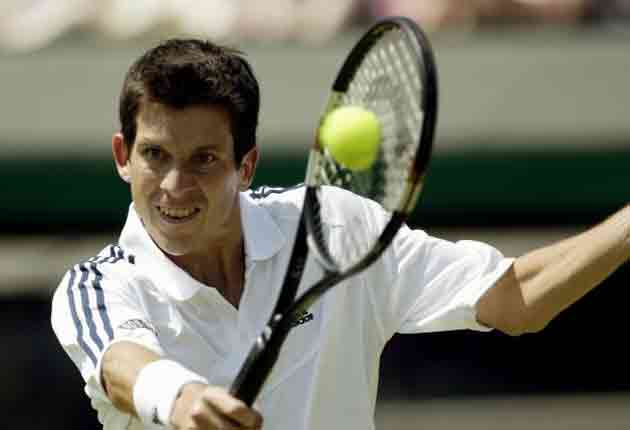Brian Viner: Salinger understood what made us love Henman – he wasn't quite good enough
The Last Word

Has there been a more delicious news story this week, including the one about the tiger befriending the rabbit in a Chinese zoo, than the revelation on page 20 of this newspaper on Thursday that the late JD Salinger, reclusive author of Catcher in the Rye, was a great admirer of Tim Henman?
It is pleasing on so many levels, but mostly on the level of gobsmacking improbability. The creator of Holden Caulfield, literature's ultimate teen rebel, so subversive that his dark angst helped to drive the addled Mark Chapman to murder John Lennon, embracing Henman, the absolute sporting embodiment of polite, middle-class English privilege. What next? Craig Bellamy revealing a penchant for the poetry of Sir John Betjeman? Sue Barker sings the Sex Pistols? Whatever, it was lovely to see Henman on the BBC Breakfast sofa yesterday morning, admitting that yes, he'd heard the story, and no, as a matter of fact he'd never read Catcher in the Rye.
And wait, because it gets better. Among the letters to his friend Donald Hartog, Salinger expressed his admiration not just for Henman but also for Tim's parents, noting with approval how little they looked, and behaved, like typically pushy tennis parents. It is certainly true that Tony and Jane Henman were unfailingly supportive of their youngest son's career while at the same time giving the impression that they would be no more likely to dance a naked tango through Wimbledon Village than clench their fists and scream "come on!" in the manner of, say, Judy Murray.
I would suggest, though, that it was precisely that air of restrained gentility that made the British, and indeed JD Salinger, reclusively watching at home in New Hampshire, so warm to Henman. That, and the suspicion that, good as he was, he wasn't quite good enough. All of which brings me to Andy Murray, who manifestly is good enough, and who tomorrow contests his third Grand Slam final. That's three more than Henman managed, yet even now, even with tangible evidence that he has what it takes to reach the business end of a Grand Slam, British sports fans have not rallied to the Murray banner as they did to the Henman bunting.
This says a great deal about our national psyche, so much that it could almost be the subject of a postgraduate's thesis, indeed there might be a PhD student labouring over it even now, concluding that while he has our unequivocal support and unyielding respect, Murray, his fierce mum urging him on with her big shouts and her clenched fists, is just that teeny bit too good and too driven, as well as too clenched of fist and too shouty, to win our wholehearted affection. Happily, he couldn't give a monkey's.
Casual sexism is nasty but media hypocrisy stinks
In homage to the title of this column, here is the last word, or at least my last word, on the Gray-Keys affair. The stench of hypocrisy rising from it has overwhelmed even the deeply unpleasant whiff of casual sexism, such has been the sanctimonious spluttering from any number of men whose own records in the business of treating women with respect fall quite a few furlongs short of impeccable. And of course, some of these men are journalists, their broadsides sanctioned by news organisations also not known for being crucibles of enlightenment.
I'm not just talking about The Sun, either, hilarious though it has been to see the tits-out-for-the-lads paper haranguing Andy Gray for his "dinosaur" attitudes. What about the BBC, where the most sensible comment on the story came from Woman's Hour (don't sack them, just make them present a women's football tournament, was the gist), but where some reporters clearly revelled in Sky's embarrassment, as though such a thing could never happen in White City or Broadcasting House?
The collective memory there is short. It's less than three weeks since the former Countryfile presenter Miriam O'Reilly won her victimisation case against the Corporation, presented as a victory against ageism, although we all know that it was institutionalised sexism, pure and simple, a far more damaging brand of prejudice than the barstool boorishness of the erstwhile Sky Sports presenters.
Old-fashioned snapshot of our game – and that's a compliment
This seems like a good week in which to celebrate old-fashioned virtues in football, given that the inoffensive compound adjective "old-fashioned" has been used in such a pejorative way to describe the views of football's new least-favourite reactionaries.
So, let me recommend a lavish book of photographs, as much of places as of people, sponsored by the Professional Footballers' Association and compiled over two decades by Stuart Roy Clarke, who has called his opus 'The Cradle of the Game'.
I'd better make no particular comment about one of the earlier photographs in the book, of the Ladies' Retiring Room at Bury FC's ground Gigg Lane, a place, according to Clarke's caption, "for the womenfolk to wait downstairs whilst the men watched the match from up top". But pictures of Oakwell and Roker Park and Roots Hall, of Sir Bobby Robson giving a team-talk to the players of Gretna FC, of the old slope being ripped up at Yeovil Town, of the mural of George Best on an end-of-terrace house in Belfast, add up to a chronicle of the modern British game to enhance any coffee table.

Join our commenting forum
Join thought-provoking conversations, follow other Independent readers and see their replies